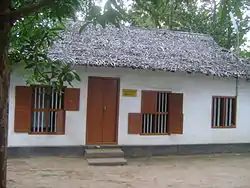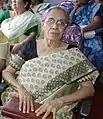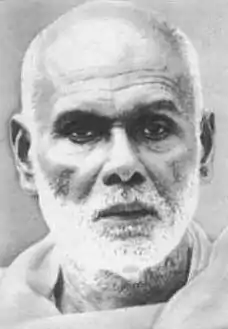Sahodaran Ayyappan
Kumbalathuparambu Ayyappan (August 21, 1889 – March 6, 1968), better identified as Sahodaran Ayyappan , was a social reformer, thinker, rationalist, journalist, and politician from Kerala, India. A vocal follower of Sree Narayana Guru, he was associated with a number of events related to the Kerala reformation movement and was the organizer of Misra Bhojanam in Cherai in 1917. He founded Sahodara Sangam, and the journal Sahodaran and was the founder editor of the magazine Yukthivadi.
Sahodaran K Ayyappan | |
|---|---|
 സഹോദരൻ അയ്യപ്പൻ | |
| Born | August 21, 1889 |
| Died | March 6, 1968 (aged 78) Kerala |
| Other names | Ayyappan master |
| Occupation(s) | Social reformer, thinker, journalist, politician |
| Spouse | Parvathy |
| Children | One daughter and a son |
| Parents |
|
Biography

K. Ayyappan was born on August 21, 1889, in Cherai, Vypin Island, in Ernakulam district of the present day south Indian state of Kerala in an aristrocatic Ezhava family of ayurvedic physicians to Kumabalathuparambil Kochavu Vaidyar and Unnooli,[1] as the youngest of their nine children.[2][3] His father died when he was a child and was brought up under the guidance of his elder brother, Achuthan Vaidyar.[4] His early education was in the traditional way and he learnt Sanskrit from local teachers such as Mattapilla Kannu Asan and Kochupilla Asan after which he started the formal education at a local school started by Nediyara Achan Bava. Subsequently, he studied at schools in Pallippuram and North Paravur before passing the pre-degree course from Malabar Christian College to join Maharaja's College, Thiruvananthapuram, the present-day University College for his under graduate studies.[5] In between, there was a short break in studies due to health issues.[4] During this period, he had the opportunity to interact with Narayana Guru and it was Guru who arranged for Ayyappan's stay in Thiruvananthapuram with the noted poet, Kumaran Asan. After completing his graduate studies in 1916, he returned to his native place to start his career started as a teacher at Rama Varma Union High School, Cherai but he could not carry his social and political life along with the teaching career and he quit the job. Later, he studied law but that was a futile attempt as he failed in the FL examination.[1]
Ayyappan was married to Parvathy and the couple had a daughter, Aisha and a son, Sugathan.[6] He died on March 6, 1968, at the age of 78,following a cardiac arrest.[1]
Reform movements
After his graduation, he returned to Cherai from Thiruvananthapuram in 1917 and founded Sahodara Sangham (The Brotherhood Association), a platform to launch his fight against the caste system.[4] Under the aegis of this organization, he organized a Misra Bhojanan, a feast where people of all castes sat and dined under one roof, at the house of Ayyappan's nephew, Raman Pillai, on May 30, 1917, a revolutionary venture during those days and the conservative Ezhava community opposed it.[7] Around 200 people including members representing the Pulaya caste, who were considered untouchable attended the feast and the effort earned him the moniker, Pulaya Ayyappan, meant to be derogatory but Ayyappan accepted it as a decoration. The founding of the Sahodara Sangham also earned him another epithet, Sahodaran Ayyappan, with which he came to be known thereafter.[8]
Narayana Guru supported the efforts of Sahodara Sangham through a message sent on May 15, 1921,[1] and in order to propagate his ideals, Ayyappan started a journal, Sahodaran, from Mattancherry;[9] the journal continued to be in print until 1956.[1] IN 1929, when M. Ramavarma Thampan, Mithavaadi Krishnan, C. V. Kunhiraman, and M. C. Joseph started the Yukthivadi (The Rationalist), he became the founder editor of the magazine. He modified the famous slogan of Narayana Guru, Oru Jaathi Oru Matham Oru Daivam Manushyanu (One Caste, One Religion, One God for Mankind) as Jati Venda, Matam Venda, Deivam Venda Manushyanu (No Caste, No Religion, No God for Mankind).[5]
Political career
In 1928, Ayyappan successfully contested the election to the Cochin Legislative Council and he retained the seat for the next 21 years.[4] He became a minister in the Cochin Legislative assembly in 1947 and when the state of Travancore and Kochi was united to form Travancore-Cochin state, he continued to serve as a minister, only to resign from the post when the government started dismissing lower level employees as an austerity measure.[5] However, in the next elections in October 1949, the Prajamandalam Party secured majority to form a ministry under the leadership of E. Ikkanda Warrier, he joined the ministry along with Panampilli Govinda Menon and C. A. Ouseph.[10] He also served as a minister under Paravoor T. K. Narayana Pillai but resigned the post when the ministerial responsibilities interfered with his social life.[1]
Literary career
Ayyappan published six books of poetry and an essay compilation, "Sadhesheeyam''.[11] Besides, he also wrote several articles and editorials which appeared in the publications he was associated with.[1]
Memorials and honours
On February 14, 1996, Shankar Dayal Sharma, the then president of India, unveiled a statue of Ayyappan in Kochi.[12] The Government of Kerala has set up Sahodaran Ayyappan Memorial at the house where Ayyappan was born[13] which houses Sahodaran Ayyappan Smaraka Library and the Sahodaran Ayyappan museum.[14] Three educational institutions in Kerala bear the name of Ayyappan, viz. Sahodaran Ayyappan Smaraka (SNDP) Yogam College, Konni, Pathanamthitta district,[15] Sahodaran Memorial High School, Cherai,[16] and the Sahodaran Ayyappan Memorial College of Education, Poothotta.[17] One of the main arterial roads in Kochi has been named after him as Sahodaran Ayyappan Road.[18] An annual award, the Sahodaran Media Award, has been instituted to recognize excellence in journalism.[19][20]
Popular media
- A documentary film about Sahodaran Ayyappan, part of a series of films on prominent Malayalis, was narrated by M. K. Sanu, who also wrote a biography of him.
Gallery
 Statue of Ayyappan in Kochi
Statue of Ayyappan in Kochi Mural depicting Mishra Bhojanam
Mural depicting Mishra Bhojanam Aisha Gopalakrishnan, Ayyappan's daughter
Aisha Gopalakrishnan, Ayyappan's daughter Issue of Yukthivadi magazine dated April 4, 1936
Issue of Yukthivadi magazine dated April 4, 1936 Birthplace
Birthplace Statue stone
Statue stone Sahodaran Ayyappan Smaraka Library
Sahodaran Ayyappan Smaraka Library
See also
See Also (Social reformers of Kerala)
References
- "Biography on Kerala Sahitya Akademi portal". Kerala Sahitya Akademi portal. 27 April 2019. Retrieved 27 April 2019.
- "Biography - Sahodaran Ayyappan Smarakam". sahodaranayyappansmarakam.org. 27 April 2019. Retrieved 27 April 2019.
- Gurudevan.Net (27 April 2019). "Sahodaran Ayyappan – Sree Narayana Gurudevan". Retrieved 27 April 2019.
- "Sahodaran Ayyappan". www.keralaculture.org. 27 April 2019. Retrieved 27 April 2019.
- "Sahodaran Ayyappan and Rationalism" (PDF). Shodhganga. 27 April 2019. Retrieved 27 April 2019.
- "Misrabhojanam centenary fete". The Hindu. 30 September 2016. Retrieved 27 April 2019.
- "Sahodaran Ayyappan - Sree Narayana Guru.in". www.sreenarayanaguru.in. 27 April 2019. Retrieved 27 April 2019.
- "Sahodara Movement" (PDF). Shodhganga. 27 April 2019. Retrieved 27 April 2019.
- "History of Kerala Legislature". 14 December 2006. Archived from the original on 14 December 2006. Retrieved 27 April 2019.
- "List of works". Kerala Sahitya Akademi. 27 April 2019. Retrieved 27 April 2019.
- "The Making of a Brotherhood: An anti-caste communal feast in Kerala and its relevance in current culture wars". The Indian Express. 11 June 2017. Retrieved 27 April 2019.
- "Sahodaran Ayyappan Museum". www.muzirisheritage.org. 27 April 2019. Retrieved 27 April 2019.
- "Sahodaran Ayyappan Memorial at Cherayi". www.keralaculture.org. 27 April 2019. Retrieved 27 April 2019.
- "Sahodaran Ayyappan Smaraka (SNDP) Yogam College". worldacad.com. 27 April 2019. Retrieved 27 April 2019.
- "SM High School, Cherai, Ernakulam". wikimapia.org. 27 April 2019. Retrieved 27 April 2019.
- "Sahodaran Ayyappan Memorial College Of Education, Poothotta". www.sampoothotta.org. 27 April 2019. Retrieved 27 April 2019.
- "Widening of Sahodaran Ayyappan Road delayed". The Hindu. 13 May 2006. Retrieved 27 April 2019.
- "'Imbibe Sahodaran Ayyappan's ideals'". The Hindu. 11 March 2013. Retrieved 27 April 2019.
- "Manorama journalist Harikrishnan bags Sahodaran media award". OnManorama. Retrieved 27 April 2019.
Further reading
- Sanu, M. K. (1980). Sahodaran Ayyappan (in Malayalam). DC Books.
- Sanu, M. K. (2011). Sahodaran K. Ayyappan (in Malayalam). Sahitya Pravarthaka Co-operative Society.
- Ayyappan, K. (1981). Sahodarante Padya Krithikal. Kottayam: D. C. Books.
External links
- "Sahodaran Ayyappan - Reformist from Kerala". 26 October 2009. Archived from the original on 26 October 2009. Retrieved 27 April 2019.
- Kerala.gov.in: Orma Film Festival 2004 - documentary on Ayyappan narrated by M. K. Sanu
